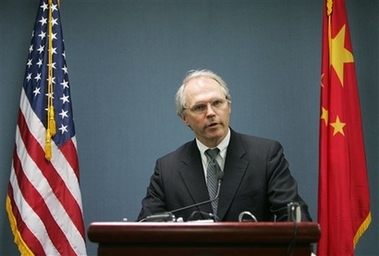Bush cautious on N. Korea nuke turnabout
(AP)Updated: 2006-11-01 08:53
WASHINGTON - In a surprise turnabout, North Korea agreed Tuesday to return to six-nation disarmament talks just three weeks after rattling the world by conducting an atomic bomb test. The breakthrough came after pressure from China and a US offer to discuss financial penalties already in place.
President Bush cautiously welcomed the deal and thanked the Chinese for brokering it. But he said the agreement wouldn't sidetrack US efforts to enforce sanctions adopted by the UN Security Council to punish Pyongyang for its October 9 nuclear test.
|
|
He said there was still "a lot of work to do" and the US would send teams to the region "to make sure that the current United Nations Security Council resolution is enforced."
The ultimate goal is "a North Korea that abandons her nuclear weapons programs and her nuclear weapons in a verifiable fashion in return for a better way forward for her people," the president said.
The unexpected agreement to restart the talks - before year's end, US officials said - was announced after envoys from North Korea, the United States and China met in Beijing, at China's invitation.
The move represented a step back from the nuclear crisis and was widely applauded, if with some reservations. North Korea has a history of walking away from the six-nation talks, only to rejoin them, then to bolt again.
"We believe that the sooner talks resume, the faster the tension around this problem will fade," Igor Ivanov, chief of Russia's presidential Security Council, said in Moscow.
Japan's UN ambassador, Kenzo Oshima, called the development "a welcome first step, but there are many, many other things that we need to closely monitor and watch." Japanese Foreign Minister Taro Aso was quoted as saying a resumption of talks "is conditional on North Korea not possessing nuclear weapons."
Just a week before contentious US congressional elections, it was a diplomatic victory for Bush. Democrats gave it a qualified but skeptical endorsement.
"It may ultimately be a positive step forward, but it is clearly not sufficient to produce the goal we all want to achieve - a halt to North Korea's nuclear weapons' activities," said Senate Democratic leader Harry Reid of Nevada. He urged Bush to name a special envoy to Pyongyang and to engage in direct US-North Korean talks.
Republicans cast it as a sign of Bush's foreign-policy leadership. "The president's strategy has effectively isolated North Korea from its neighbors in the region and now appears to have returned that rogue regime to the negotiating table," said Senate Majority Leader Bill Frist of Tennessee.
However, China's leaning on its communist neighbor appeared to be the major factor in the progress, not US diplomacy, and Bush acknowledged Beijing's role in Oval Office comments to reporters.
| 1 | 2 |  |
|
||
|
||
|
|
